外研版(2019)选择性必修第四册Unit 1Looking forwards Using language 各种时态复习课件(共32张PPT)
文档属性
| 名称 | 外研版(2019)选择性必修第四册Unit 1Looking forwards Using language 各种时态复习课件(共32张PPT) | 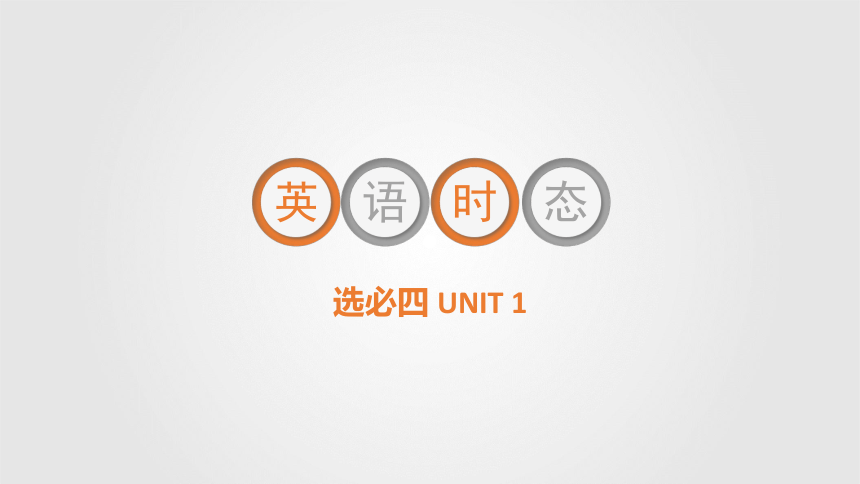 | |
| 格式 | pptx | ||
| 文件大小 | 625.8KB | ||
| 资源类型 | 教案 | ||
| 版本资源 | 外研版(2019) | ||
| 科目 | 英语 | ||
| 更新时间 | 2023-05-02 22:40:38 | ||
图片预览

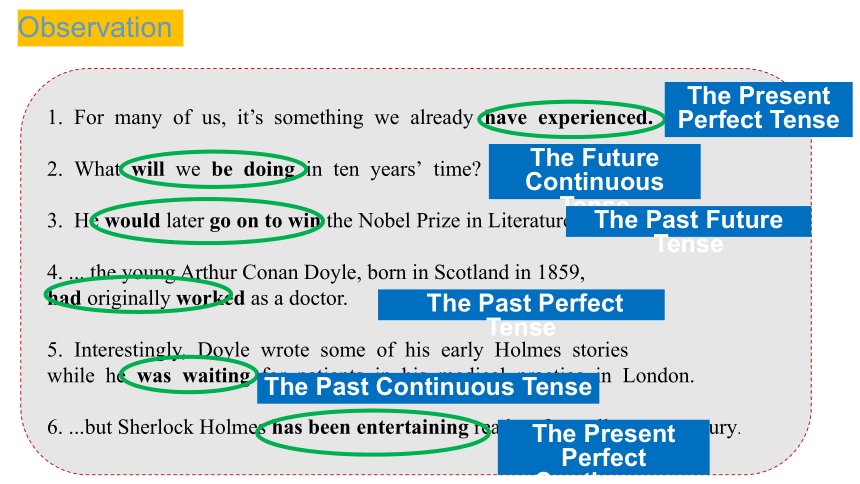
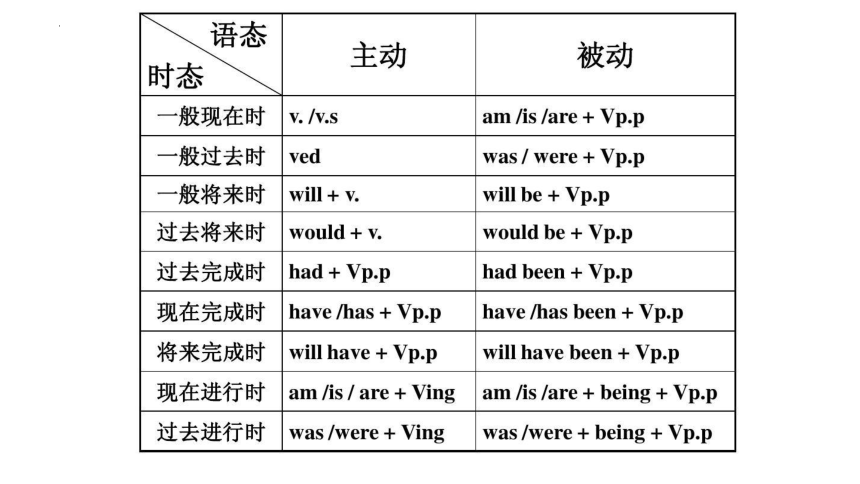


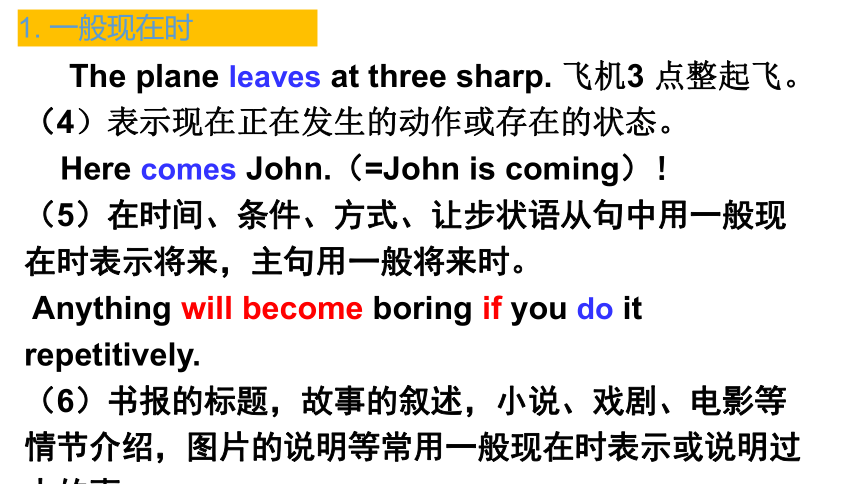
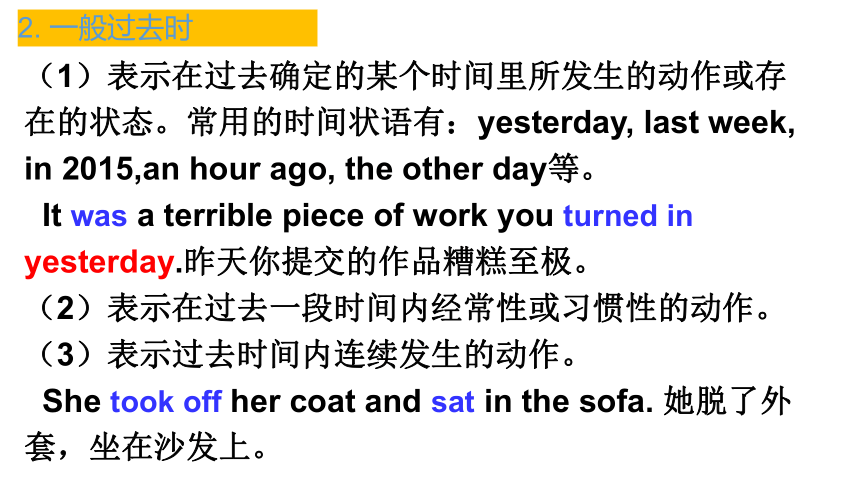
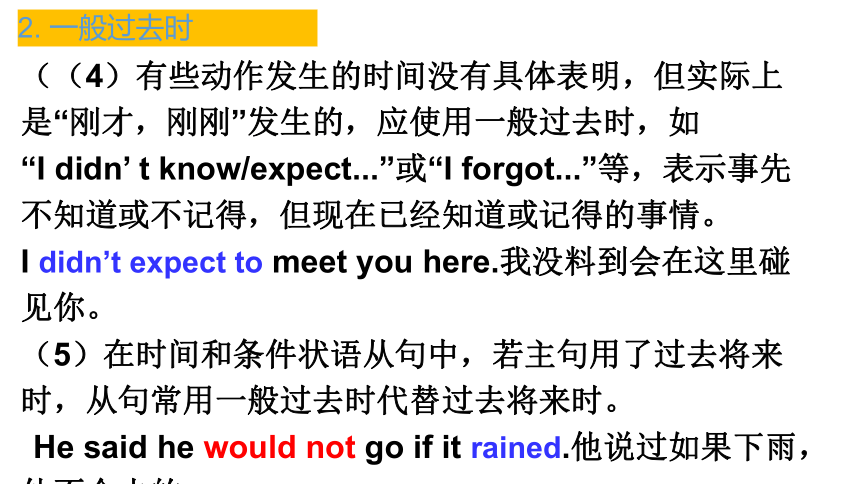
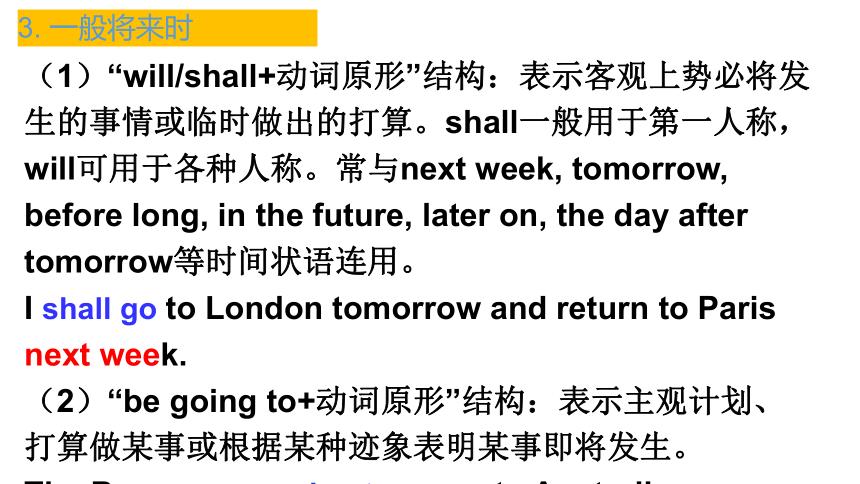
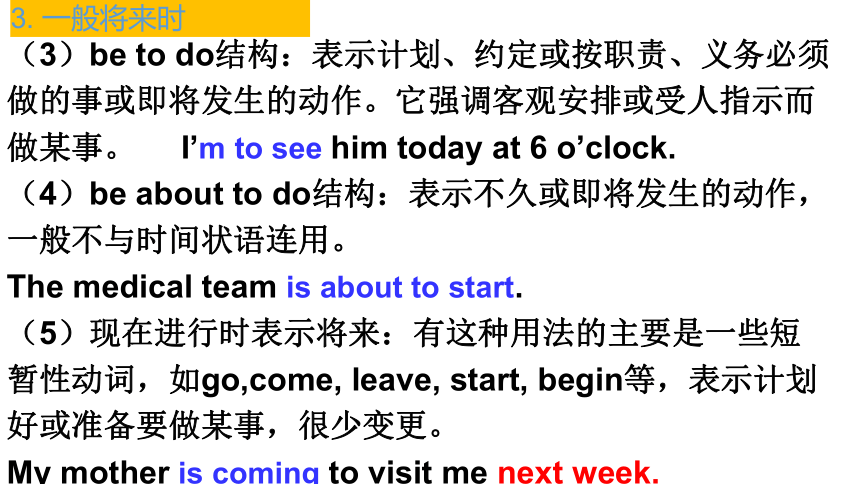
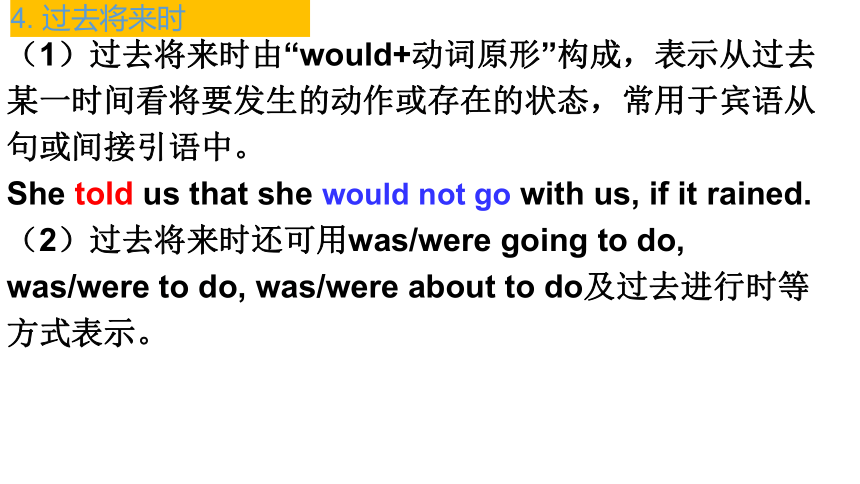

文档简介
(共32张PPT)
英
语
时
态
选必四 unit 1
1. For many of us, it’s something we already have experienced.
2. What will we be doing in ten years’ time
3. He would later go on to win the Nobel Prize in Literature.
4. ... the young Arthur Conan Doyle, born in Scotland in 1859,
had originally worked as a doctor.
5. Interestingly, Doyle wrote some of his early Holmes stories
while he was waiting for patients in his medical practice in London.
6. ...but Sherlock Holmes has been entertaining readers for well over a century.
Observation
The Present Perfect Tense
The Future Continuous Tense
The Past Future Tense
The Past Perfect Tense
The Past Continuous Tense
The Present Perfect Continuous Tense
01
一般时态的用法
1. 一般现在时
3. 一般将来时
2. 一般过去时
4. 过去将来时
1. 一般现在时
(1)表示经常性、习惯性的动作或存在的状态,常与often, always, sometimes, every day, usually等时间状语连用。
I brush my teeth twice a day.
(2)表示客观真理、客观存在、科学事实、俗语等.
Light travels faster than sound.
(3)表示按规定、计划、安排、时间表等马上要发生的事,通常有表示将来的时间状语。该用法仅限于少数表示短暂意义的动词,如begin, start,end, finish, stop, go, come, leave, sail, arrive, return, close, open 等
1. 一般现在时
The plane leaves at three sharp. 飞机3 点整起飞。
(4)表示现在正在发生的动作或存在的状态。
Here comes John.(=John is coming)!
(5)在时间、条件、方式、让步状语从句中用一般现在时表示将来,主句用一般将来时。
Anything will become boring if you do it repetitively.
(6)书报的标题,故事的叙述,小说、戏剧、电影等情节介绍,图片的说明等常用一般现在时表示或说明过去的事。
2. 一般过去时
(1)表示在过去确定的某个时间里所发生的动作或存在的状态。常用的时间状语有:yesterday, last week, in 2015,an hour ago, the other day等。
It was a terrible piece of work you turned in yesterday.昨天你提交的作品糟糕至极。
(2)表示在过去一段时间内经常性或习惯性的动作。
(3)表示过去时间内连续发生的动作。
She took off her coat and sat in the sofa. 她脱了外套,坐在沙发上。
2. 一般过去时
((4)有些动作发生的时间没有具体表明,但实际上是“刚才,刚刚”发生的,应使用一般过去时,如
“I didn’ t know/expect...”或“I forgot...”等,表示事先不知道或不记得,但现在已经知道或记得的事情。
I didn’t expect to meet you here.我没料到会在这里碰见你。
(5)在时间和条件状语从句中,若主句用了过去将来时,从句常用一般过去时代替过去将来时。
He said he would not go if it rained.他说过如果下雨,他不会去的。
3. 一般将来时
(1)“will/shall+动词原形”结构:表示客观上势必将发生的事情或临时做出的打算。shall一般用于第一人称,will可用于各种人称。常与next week, tomorrow, before long, in the future, later on, the day after tomorrow等时间状语连用。
I shall go to London tomorrow and return to Paris next week.
(2)“be going to+动词原形”结构:表示主观计划、打算做某事或根据某种迹象表明某事即将发生。
The Browns are going to move to Australia.
It is going to rain. Take an umbrella with you.
3. 一般将来时
(3)be to do结构:表示计划、约定或按职责、义务必须做的事或即将发生的动作。它强调客观安排或受人指示而做某事。 I’m to see him today at 6 o’clock.
(4)be about to do结构:表示不久或即将发生的动作,一般不与时间状语连用。
The medical team is about to start.
(5)现在进行时表示将来:有这种用法的主要是一些短暂性动词,如go,come, leave, start, begin等,表示计划好或准备要做某事,很少变更。
My mother is coming to visit me next week.
4. 过去将来时
(1)过去将来时由“would+动词原形”构成,表示从过去某一时间看将要发生的动作或存在的状态,常用于宾语从句或间接引语中。
She told us that she would not go with us, if it rained.
(2)过去将来时还可用was/were going to do, was/were to do, was/were about to do及过去进行时等方式表示。
02
进行时态的用法
1. 现在进行时
3. 将来进行时
2. 过去进行时
1. 现在进行时
(1)表示说话时正在进行的动作或存在的状态。
(2)表示现阶段一直在进行的动作,但此时此刻该动作不一定正在进行。
We are making model planes these days. 这些天我们在做飞机模型。
(3)表示此时此刻某一个动作不断地重复。
(4)表示按计划或安排将要发生的动作,常与一个表示将来的时间状语连用。
I am going on a trip soon. 我很快就要去旅行了。
1. 现在进行时
(5)与always, usually, forever等连用表达生气、赞扬、好奇等感彩。
He is always helping others.他总是帮助别人。
(6)表示动作逐渐变化的过程,常用动词有get, come, go, leave, start, stop等。
His health is improving each day.他的健康状况每天都在好转。
注意:下列动词不宜用进行时
感觉类,如look、smell、feel、sound、taste、see、hear等。
感情类,如like、love、prefer、admire、hate、fear等。
所有类,如have、contain、own、hold、belong to等。
2. 过去进行时
(1)表示过去某一时刻或某一阶段正在进行的动作。
(2)与短暂性动词go, come, begin, arrive, start等连用,表示从过去某一时刻看即将发生的动作,多用于从句中。 She asked him whether he was coming back for supper.
(3)表示一个过去的动作正在进行时,另一个过去的动作发生了,常与when, while引导的时间状语从句连用。 He telephoned me when I was tidying my room.
2. 过去进行时
(4)表示礼貌,不表示过去发生的动作,而表达现在的客气或礼貌。
I was thinking if you could finish your work this week.
(5)表示过去经常发生的动作,常与always, forever连用,带有一定的感彩。
(6)表示故事发生的背景。
It was a cold night. It was raining heavily outside. 那是一个寒冷的夜晚。当时外面正下着大雨。
3. 将来进行时
(1)现在将来进行时是指从现在算起的将来某个时间正在进行的动作,或往往是已经做好安排,认为某事肯定会发生。
This time tomorrow I’ll be watching you play on TV.
(2)过去将来进行时表示就过去某一时间内而言,将来正在进行的动作,主要用于宾语从句中。
Doctor Wang said he would be giving another talk on this subject at the same time next week.
03
完成时态的用法
1. 现在完成时
3. 将来完成时
2. 过去完成时
4. 现在完成进行时
1. 现在完成时
(1)表示“影响”:表示到现在为止动作已经发生或完成,但结果仍对现在有影响。
Look!Somebody has cleaned the sofa. 瞧,已经有人清洗了沙发。
(2)表示“完成”:过去开始的动作到现在已结束,或马上就要结束。
I have already searched the Internet but found nothing.我已经在网上查过了,但什么都没找到。
1. 现在完成时
(3)表示“经历”:表示从过去到现在经历过的事情,常与often, never, ever, only, twice, before,since等时间状语连用。
We have seen that film before.
(4)表示“持续”:表示过去某一动作或行为持续到现在,并有可能继续持续下去,常与“since+时间点”,“for+时间段”,so far、now、today、this week(month、year)、for a long time、in the past/last few years、these days等连用。
We have learnt 500 words these days.我们最近已经学习了500个单词了。
1. 现在完成时
(5)在时间、条件状语从句中代替一般将来时。
I’ ll watch TV as soon as I’ ve finished my homework. 我一做完作业就看电视。
固定句型:
①It is/has been+时间段+since...表示“自从……以来已经……”。
It is/has been ten years since I graduated from the university.我已经从这所大学毕业十年了。
②This/It/That is the first/second/third...time(that)...表示“这/那是(某人)第几次做某事”,that从句中要用现在完成时。
This is the first time that I have been here.这是我第一次来这里。
2. 过去完成时
(1)表示在过去某一时刻或动作之前已经完成的动作,即“过去的过去”。
He said that he had never seen such a beautiful bird before.
(2)表示开始于过去某一时间的动作或状态延续到过去另一时间,并有可能持续下去,常与for, since等词连用。
It had been very windy for a few hours and it had rained for two days. 风刮了好几个小时,雨已下了两天。
2. 过去完成时
(3)表示“希望、打算、计划”的动词hope, think, expect, intend, mean等的过去完成时表示未曾实现的愿望、计划,意为“本想,本打算,本计划”等。
We had mearnt to go to your party yesterday, but we were too busy.
固定句型:
①表示“一……就……”的“hardly/scarcely...when...”“no sooner...than...”等句式中,主句常用过去完成时。
②“That/It was the+序数词+time+that从句”结构中。
③“It was+时间段+since从句”结构中。
3. 将来完成时
表示将来某一时间之前完成的动作,并对将来产生一定的影响。
I will have lived in Shenzhen for 18 years by the year of 2028.
Will you have finished your work by the end of this month
You will have arrived at Shanghai by this time tomorrow.
现在完成进行时
(1)表示动作从过去某一时间开始一直延续到现在或离现在不远的时间,这一动作可能刚完成,也可能仍在进行。这种时态多用延续性动词。
We have been working on this project for over a month.
(2)现在完成进行时有时所表示的动作并不是一直在不停地进行,而是在断断续续地重复。这时现在完成进行时可用非延续性动词。
I have been ringing you several times in two days. 这两天内我给你打过几次电话。
现在完成进行时
(3)现在完成进行时有时可指“刚才”或“近来”发生的动作,往往暗示这个动作对现在的影响,和现在的情况有联系,常含有一种因果关系。
I feel a little tired because I have been playing basketball. 我有些累,我刚才一直在打篮球。
04
当堂检测
1.Later, engineers _________(manage) to construct railways in a system of deep
tunnels(隧道), which became known as the tube.
2.When fat and salt are removed from food, the food tastes as if it is missing something.
As a result, people ________(eat)more food to try to make up for that something
missing.
managed
will eat
3.Just last year, I _______________(conduct) a workshop when someone knocked at
the classroom door.
4.This cycle ______(go) day after day: The walls warm up during the day and cool
off during the night and are thus always a timely offset for the outside temperature.
9.It was the fourth time she _____________(shop) online for hours.
was conducting
goes
had shopped
英
语
时
态
选必四 unit 1
1. For many of us, it’s something we already have experienced.
2. What will we be doing in ten years’ time
3. He would later go on to win the Nobel Prize in Literature.
4. ... the young Arthur Conan Doyle, born in Scotland in 1859,
had originally worked as a doctor.
5. Interestingly, Doyle wrote some of his early Holmes stories
while he was waiting for patients in his medical practice in London.
6. ...but Sherlock Holmes has been entertaining readers for well over a century.
Observation
The Present Perfect Tense
The Future Continuous Tense
The Past Future Tense
The Past Perfect Tense
The Past Continuous Tense
The Present Perfect Continuous Tense
01
一般时态的用法
1. 一般现在时
3. 一般将来时
2. 一般过去时
4. 过去将来时
1. 一般现在时
(1)表示经常性、习惯性的动作或存在的状态,常与often, always, sometimes, every day, usually等时间状语连用。
I brush my teeth twice a day.
(2)表示客观真理、客观存在、科学事实、俗语等.
Light travels faster than sound.
(3)表示按规定、计划、安排、时间表等马上要发生的事,通常有表示将来的时间状语。该用法仅限于少数表示短暂意义的动词,如begin, start,end, finish, stop, go, come, leave, sail, arrive, return, close, open 等
1. 一般现在时
The plane leaves at three sharp. 飞机3 点整起飞。
(4)表示现在正在发生的动作或存在的状态。
Here comes John.(=John is coming)!
(5)在时间、条件、方式、让步状语从句中用一般现在时表示将来,主句用一般将来时。
Anything will become boring if you do it repetitively.
(6)书报的标题,故事的叙述,小说、戏剧、电影等情节介绍,图片的说明等常用一般现在时表示或说明过去的事。
2. 一般过去时
(1)表示在过去确定的某个时间里所发生的动作或存在的状态。常用的时间状语有:yesterday, last week, in 2015,an hour ago, the other day等。
It was a terrible piece of work you turned in yesterday.昨天你提交的作品糟糕至极。
(2)表示在过去一段时间内经常性或习惯性的动作。
(3)表示过去时间内连续发生的动作。
She took off her coat and sat in the sofa. 她脱了外套,坐在沙发上。
2. 一般过去时
((4)有些动作发生的时间没有具体表明,但实际上是“刚才,刚刚”发生的,应使用一般过去时,如
“I didn’ t know/expect...”或“I forgot...”等,表示事先不知道或不记得,但现在已经知道或记得的事情。
I didn’t expect to meet you here.我没料到会在这里碰见你。
(5)在时间和条件状语从句中,若主句用了过去将来时,从句常用一般过去时代替过去将来时。
He said he would not go if it rained.他说过如果下雨,他不会去的。
3. 一般将来时
(1)“will/shall+动词原形”结构:表示客观上势必将发生的事情或临时做出的打算。shall一般用于第一人称,will可用于各种人称。常与next week, tomorrow, before long, in the future, later on, the day after tomorrow等时间状语连用。
I shall go to London tomorrow and return to Paris next week.
(2)“be going to+动词原形”结构:表示主观计划、打算做某事或根据某种迹象表明某事即将发生。
The Browns are going to move to Australia.
It is going to rain. Take an umbrella with you.
3. 一般将来时
(3)be to do结构:表示计划、约定或按职责、义务必须做的事或即将发生的动作。它强调客观安排或受人指示而做某事。 I’m to see him today at 6 o’clock.
(4)be about to do结构:表示不久或即将发生的动作,一般不与时间状语连用。
The medical team is about to start.
(5)现在进行时表示将来:有这种用法的主要是一些短暂性动词,如go,come, leave, start, begin等,表示计划好或准备要做某事,很少变更。
My mother is coming to visit me next week.
4. 过去将来时
(1)过去将来时由“would+动词原形”构成,表示从过去某一时间看将要发生的动作或存在的状态,常用于宾语从句或间接引语中。
She told us that she would not go with us, if it rained.
(2)过去将来时还可用was/were going to do, was/were to do, was/were about to do及过去进行时等方式表示。
02
进行时态的用法
1. 现在进行时
3. 将来进行时
2. 过去进行时
1. 现在进行时
(1)表示说话时正在进行的动作或存在的状态。
(2)表示现阶段一直在进行的动作,但此时此刻该动作不一定正在进行。
We are making model planes these days. 这些天我们在做飞机模型。
(3)表示此时此刻某一个动作不断地重复。
(4)表示按计划或安排将要发生的动作,常与一个表示将来的时间状语连用。
I am going on a trip soon. 我很快就要去旅行了。
1. 现在进行时
(5)与always, usually, forever等连用表达生气、赞扬、好奇等感彩。
He is always helping others.他总是帮助别人。
(6)表示动作逐渐变化的过程,常用动词有get, come, go, leave, start, stop等。
His health is improving each day.他的健康状况每天都在好转。
注意:下列动词不宜用进行时
感觉类,如look、smell、feel、sound、taste、see、hear等。
感情类,如like、love、prefer、admire、hate、fear等。
所有类,如have、contain、own、hold、belong to等。
2. 过去进行时
(1)表示过去某一时刻或某一阶段正在进行的动作。
(2)与短暂性动词go, come, begin, arrive, start等连用,表示从过去某一时刻看即将发生的动作,多用于从句中。 She asked him whether he was coming back for supper.
(3)表示一个过去的动作正在进行时,另一个过去的动作发生了,常与when, while引导的时间状语从句连用。 He telephoned me when I was tidying my room.
2. 过去进行时
(4)表示礼貌,不表示过去发生的动作,而表达现在的客气或礼貌。
I was thinking if you could finish your work this week.
(5)表示过去经常发生的动作,常与always, forever连用,带有一定的感彩。
(6)表示故事发生的背景。
It was a cold night. It was raining heavily outside. 那是一个寒冷的夜晚。当时外面正下着大雨。
3. 将来进行时
(1)现在将来进行时是指从现在算起的将来某个时间正在进行的动作,或往往是已经做好安排,认为某事肯定会发生。
This time tomorrow I’ll be watching you play on TV.
(2)过去将来进行时表示就过去某一时间内而言,将来正在进行的动作,主要用于宾语从句中。
Doctor Wang said he would be giving another talk on this subject at the same time next week.
03
完成时态的用法
1. 现在完成时
3. 将来完成时
2. 过去完成时
4. 现在完成进行时
1. 现在完成时
(1)表示“影响”:表示到现在为止动作已经发生或完成,但结果仍对现在有影响。
Look!Somebody has cleaned the sofa. 瞧,已经有人清洗了沙发。
(2)表示“完成”:过去开始的动作到现在已结束,或马上就要结束。
I have already searched the Internet but found nothing.我已经在网上查过了,但什么都没找到。
1. 现在完成时
(3)表示“经历”:表示从过去到现在经历过的事情,常与often, never, ever, only, twice, before,since等时间状语连用。
We have seen that film before.
(4)表示“持续”:表示过去某一动作或行为持续到现在,并有可能继续持续下去,常与“since+时间点”,“for+时间段”,so far、now、today、this week(month、year)、for a long time、in the past/last few years、these days等连用。
We have learnt 500 words these days.我们最近已经学习了500个单词了。
1. 现在完成时
(5)在时间、条件状语从句中代替一般将来时。
I’ ll watch TV as soon as I’ ve finished my homework. 我一做完作业就看电视。
固定句型:
①It is/has been+时间段+since...表示“自从……以来已经……”。
It is/has been ten years since I graduated from the university.我已经从这所大学毕业十年了。
②This/It/That is the first/second/third...time(that)...表示“这/那是(某人)第几次做某事”,that从句中要用现在完成时。
This is the first time that I have been here.这是我第一次来这里。
2. 过去完成时
(1)表示在过去某一时刻或动作之前已经完成的动作,即“过去的过去”。
He said that he had never seen such a beautiful bird before.
(2)表示开始于过去某一时间的动作或状态延续到过去另一时间,并有可能持续下去,常与for, since等词连用。
It had been very windy for a few hours and it had rained for two days. 风刮了好几个小时,雨已下了两天。
2. 过去完成时
(3)表示“希望、打算、计划”的动词hope, think, expect, intend, mean等的过去完成时表示未曾实现的愿望、计划,意为“本想,本打算,本计划”等。
We had mearnt to go to your party yesterday, but we were too busy.
固定句型:
①表示“一……就……”的“hardly/scarcely...when...”“no sooner...than...”等句式中,主句常用过去完成时。
②“That/It was the+序数词+time+that从句”结构中。
③“It was+时间段+since从句”结构中。
3. 将来完成时
表示将来某一时间之前完成的动作,并对将来产生一定的影响。
I will have lived in Shenzhen for 18 years by the year of 2028.
Will you have finished your work by the end of this month
You will have arrived at Shanghai by this time tomorrow.
现在完成进行时
(1)表示动作从过去某一时间开始一直延续到现在或离现在不远的时间,这一动作可能刚完成,也可能仍在进行。这种时态多用延续性动词。
We have been working on this project for over a month.
(2)现在完成进行时有时所表示的动作并不是一直在不停地进行,而是在断断续续地重复。这时现在完成进行时可用非延续性动词。
I have been ringing you several times in two days. 这两天内我给你打过几次电话。
现在完成进行时
(3)现在完成进行时有时可指“刚才”或“近来”发生的动作,往往暗示这个动作对现在的影响,和现在的情况有联系,常含有一种因果关系。
I feel a little tired because I have been playing basketball. 我有些累,我刚才一直在打篮球。
04
当堂检测
1.Later, engineers _________(manage) to construct railways in a system of deep
tunnels(隧道), which became known as the tube.
2.When fat and salt are removed from food, the food tastes as if it is missing something.
As a result, people ________(eat)more food to try to make up for that something
missing.
managed
will eat
3.Just last year, I _______________(conduct) a workshop when someone knocked at
the classroom door.
4.This cycle ______(go) day after day: The walls warm up during the day and cool
off during the night and are thus always a timely offset for the outside temperature.
9.It was the fourth time she _____________(shop) online for hours.
was conducting
goes
had shopped
